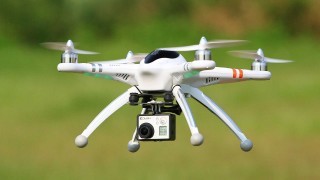Ghana has launched its first ever medical drone delivery service and the largest of such drone delivery networks in the world with its ‘Fly-To-Save-A-Life Project’. The project, which is a collaboration between Ghana’s Ministry of Health, Gavi, the Vaccine Alliance and California-based automated logistics company, Zipline, will provide rapid response to medical emergencies, particularly in remote areas.
The service will be in operation 24 hours a day, seven days a week in four distribution centres, each hosting 30 drones that will make up to 600 on-demand delivery flights daily to 2,000 health centres to serve 12 million people across the country. Each centre will also be one hundred percent staffed by Ghanaian engineers, health care professionals and logistics personnel.
Health centres can request supplies via text message, with packaging and delivery taking an average of 30 minutes. Up to 12 routine and emergency vaccines including vaccines for polio, yellow fever, measles, and meningitis will be available for delivery, as well as 148 lifesaving blood and medical products selected by Ghana’s Ministry of Health. The drone network will be integrated into the country’s national healthcare supply chain and will help prevent vaccine stockouts in health facilities and also during national immunisation campaigns.
“The ability of the government to supplement routine immunisation on demand will allow us to make sure that there will always be enough life-saving vaccines for every child in Ghana,” said Dr Seth Berkley, CEO of Gavi, the Vaccine Alliance. “This is an exciting development for Gavi that is ultimately going to ensure we leave no one behind and help us protect more children living in remote areas against vaccine-preventable diseases,” he added.
According to Ghana’s Vice President, Dr Mamahudu Bawumia, the ‘Fly-To-Save-A-Life Project’ is one way the Ghanaian government is developing the country inclusively and actively working to reduce the number of avoidable deaths, if not prevent them completely. “We are working on how to use technology to advance our development, to improve citizens’ access to and delivery of the public services they need no matter where they live in this country,” he said.
Initially, critics argued that the Ghanaian government ought to spend money on getting ambulances and building better health centres rather than on launching a medical drone service. But the government granted Zipline $12.5 million to run the project for four years after the initiative was approved along partisan lines in parliament by 102 votes to 58.
“It is important to note, however, that this is not a replacement for the already existing programmes, but a compliment. By July this year, the government will receive 275 ambulances already purchased, to strengthen the health delivery system and make treatment of emergency cases more effective,” Dr Bawumia explained at the launch of ‘Fly-To-Save-A-Life Project.’
Already, the project has attracted international attention and support from major companies and organizations like the Bill and Melinda Gates Foundation, pharmaceutical giants, Novartis and Pfizer, and parcel delivery firm, UPS. Also, Ghana will become the base for training future Zipline flight operators as it hopes to expand to more African countries in the coming years.
Zipline’s medical drone delivery service first took flight in Rwanda in 2016, enabling access to life-saving medical supplies in minutes for millions of Rwandan citizens in remote communities. Since then, it has expanded across the country, making more than 13,000 deliveries to date, a third of which were to patients in critical situations of life and death.
Watch video below to learn more:








